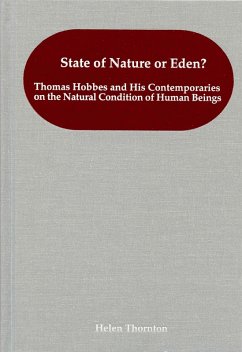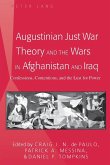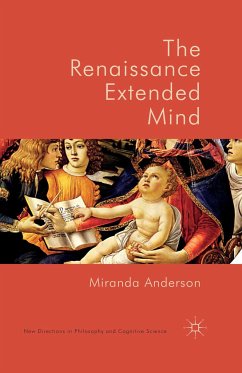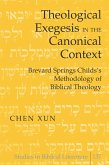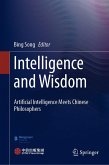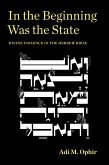State of Nature or Eden? Thomas Hobbes and his Contemporaries on the Natural Condition of Human Beings aims to explain how Hobbes's state of nature was understood by a contemporary readership, whose most important referencepoint for such a condition was the original condition of human beings at the creation, in other words in Eden.
State of Nature or Eden? Thomas Hobbes and his Contemporaries on the Natural Condition of Human Beings aims to explain how Hobbes's state of nature was understood by a contemporary readership, whose most important referencepoint for such a condition was the original condition of human beings at the creation, in other words in Eden. The book uses ideas about how readers brought their own reading of other texts to any reading, that reading is affected by the context in which the reader reads, and that the Bible was the model for all reading in the early modern period. It combines these ideas with the primary evidence of the contemporary critical reaction to Hobbes, to reconstruct how Hobbes's state of nature was read by his contemporaries. The book argues that what determined how Hobbes's seventeenth century readers responded to his description of the state of nature were their views on the effects ofthe Fall. Hobbes's contemporary critics, the majority of whom were Aristotelians and Arminians, thought that the Fall had corrupted human nature, although not to the extent implied by Hobbes's description. Further, they wanted tolook at human beings as they should have been, or ought to be. Hobbes, on the other hand, wanted to look at human beings as they were, and in doing so was closer to Augustinian, Lutheran and Reformed interpretations, which arguedthat nature had been inverted by the Fall. For those of Hobbes's contemporaries who shared these theological assumptions, there were important parallels to be seen between Hobbes's account and that of scripture, although on somepoints his description could have been seen as a subversion of scripture. The book also demonstrates that Hobbes was working within the Protestant tradition, as well as showing how he used different aspects of this tradition.
Helen Thornton is an Independent Scholar. She completed her PhD at the University of Hull.
State of Nature or Eden? Thomas Hobbes and his Contemporaries on the Natural Condition of Human Beings aims to explain how Hobbes's state of nature was understood by a contemporary readership, whose most important referencepoint for such a condition was the original condition of human beings at the creation, in other words in Eden. The book uses ideas about how readers brought their own reading of other texts to any reading, that reading is affected by the context in which the reader reads, and that the Bible was the model for all reading in the early modern period. It combines these ideas with the primary evidence of the contemporary critical reaction to Hobbes, to reconstruct how Hobbes's state of nature was read by his contemporaries. The book argues that what determined how Hobbes's seventeenth century readers responded to his description of the state of nature were their views on the effects ofthe Fall. Hobbes's contemporary critics, the majority of whom were Aristotelians and Arminians, thought that the Fall had corrupted human nature, although not to the extent implied by Hobbes's description. Further, they wanted tolook at human beings as they should have been, or ought to be. Hobbes, on the other hand, wanted to look at human beings as they were, and in doing so was closer to Augustinian, Lutheran and Reformed interpretations, which arguedthat nature had been inverted by the Fall. For those of Hobbes's contemporaries who shared these theological assumptions, there were important parallels to be seen between Hobbes's account and that of scripture, although on somepoints his description could have been seen as a subversion of scripture. The book also demonstrates that Hobbes was working within the Protestant tradition, as well as showing how he used different aspects of this tradition.
Helen Thornton is an Independent Scholar. She completed her PhD at the University of Hull.
Dieser Download kann aus rechtlichen Gründen nur mit Rechnungsadresse in A, D ausgeliefert werden.

